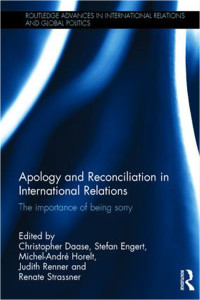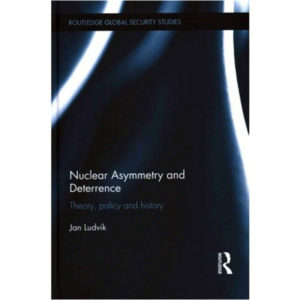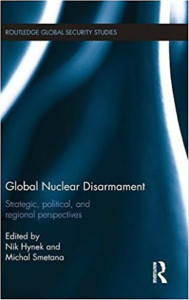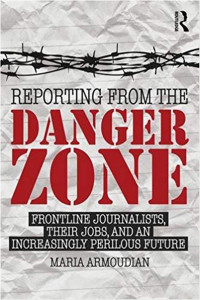

Apology and Reconciliation in International Relations: The Importance of Being Sorry
Eds Christopher Daase, Stefan Engert, Michel-André Horelt, Judith Renner, Renate Strassner
Routledge (2016)
Rs14,822
This book looks into the role and effects of public apologies in international relations. It focuses on two major questions - why and when do states issue apologies for historic crimes and how and under what conditions are these apologies successful in remedying conflictive relationships?
In recent years, we have witnessed an unseen popularity of apologies, with numerous politicians, managers and clergymen being eager to apologise and atone for the wrong-doings of their countries or institutions. Public apologies, thus, are a new and highly interesting, while nevertheless still puzzling phenomenon, the precise role and meaning of which in international politics remains to be explored. This book sets out to do exactly this. Focusing in particular on state apologies, it assembles twelve detailed empirical case studies which deal with the two questions raised above. In the first part, the case studies reconstruct the processes in which state representatives react to calls for public atonement, and in the second part the case studies explore the reactions to the apology and evaluate signs for its success or failure.
All case studies are based on a theoretical framework which is outlined in the introduction to the book and helps develop tentative assumptions about the emergence and the effects of state apologies, drawing on different strands of literature, such as political science, philosophy, sociology or psychology. This work will be of great interest to students and scholars of conflict reconciliation, international relations and transitional justice.
Christopher Daase is Professor of International Organization at the Goethe-University Frankfurt and Director of the Department of International Organizations and International Law at the Peace Research Institute Frankfurt (PRIF). His research focuses on international security and security governance, normative orders in international relations as well as apologies and memory politics.

Nuclear Asymmetry and Deterrence: Theory, Policy and History
Jan Ludvik
Routledge (2017)
Rs14,042
This book offers a broader theory of nuclear deterrence and examines the way nuclear and conventional deterrence interact with non-military factors in a series of historical case studies.
The existing body of literature largely leans toward the analytical primacy of nuclear deterrence and it is often implicitly assumed that nuclear weapons are so important that, when they are present, other factors need not be studied. This book addresses this omission. It develops a research framework that incorporates the military aspects of deterrence, both nuclear and conventional, together with various perceptual factors, international circumstances, domestic politics, and norms. This framework is then used to re-examine five historical crises that brought two nuclear countries to the brink of war: the hostile asymmetric nuclear relations between the United States and China in the early 1960s; between the Soviet Union and China in the late 1960s; between Israel and Iraq in 1977–1981; between the United States and North Korea in 1992–1994; and, finally, between the United States and the Soviet Union during the 1962 Cuban missile crisis. The main empirical findings challenge the common expectation that the threat of nuclear retaliation represents the ultimate deterrent. In fact, it can be said, with a high degree of confidence, that it was rather the threat of conventional retaliation that acted as a major stabilizer.
This book will be of much interest to students of nuclear proliferation, cold war studies, deterrence theory, security studies and IR in general.
Jan Ludvik is Assistant Professor at the Department of Security Studies and Research Fellow at the Center for Security Policy, Charles University, Czech Republic. He has a PhD in International Relations.

Global Nuclear Disarmament: Strategic, Political, and Regional Perspectives
Nik Hynek (Editor), Michal Smetana (Editor)
Routledge (2016)
Rs14,822
This book examines the issue of nuclear disarmament in different strategic, political, and regional contexts.
This volume seeks to provide a rich theoretical and practical insight to one of the major topics in the field of international security: global abolishment of nuclear weapons. Renewed calls for a nuclear weapons-free world have sparked a wide academic debate on both the attainability of such goal and the steps that should be taken. Comparably less attention, however, has been paid to theoretically informed considerations of the consequences of nuclear abolition. Comprising essays from leading scholars and experts within the field, this collection discusses the fundamental theoretical and conceptual foundations of nuclear disarmament and subsequently tries to assess its hypothetical impact in global and regional contexts. The varied methodological approach of the contributors aims to advance a multi-theoretical and multi-perspectival view of the issue. The book is organized in three main sections: ‘Strategic Perspectives’, dealing with the specific constraints and facilitators for the states to achieve their core objectives; ‘Political Perspectives’, with the focus on the power of norms, belief-systems and ideas; and ‘Regional Perspectives’, with the analyses of seven regional and/or state-specific nuclear contexts. As a whole, the volume provides a detailed, complex overview of the risks and opportunities that are embedded in the vision of a nuclear weapon-free world.
This book will be of great interest to students of nuclear proliferation, arms control, war and conflict studies, international relations and security studies.
Nik Hynek is Associate Professor at the Metropolitan University and Charles University Prague, Czech Republic. He is the author or editor of several books, including Human Security as Statecraft (Routledge 2012) and Statebuilding in Afghanistan (co-editor, Routledge 2011).
Michal Smetana is Lecturer and Research Associate at the Institute of Political Studies, Charles University in Prague, Czech Republic.

Reporting from the Danger Zone: Frontline Journalists, Their Jobs, and an Increasingly Perilous Future
Maria Armoudian
Routledge (2016)
Rs14,822
Journalism is a dangerous business when one’s “beat” is a war zone. Armoudian reveals the complications facing frontline journalists who cover warzones, hot spots and other hazardous situations. It compares yesterday’s conflict journalism, which was fraught with its own dangers, with today’s even more perilous situations?in the face of shrinking journalism budgets, greater reliance on freelancers, tracking technologies, and increasingly hostile adversaries. It also contrasts the difficulties of foreign correspondents who navigate alien sources, languages and land, with domestically-situated correspondents who witness their own homelands being torn apart.
Maria Armoudian is a Lecturer in Politics and International Relations at the University of Auckland. She is the author of Kill the Messenger: Media’s Role in the Fate of the World.

Managing Public Sector Projects: A Strategic Framework for Success in an Era of Downsized Government
David S. Kassel
Routledge (2010)
Rs7,799
Filling a gap in project management literature, Managing Public Sector Projects: A Strategic Framework for Success in an Era of Downsized Government supplies managers and administrators?at all levels of government?with expert guidance on all aspects of public sector project management. From properly allocating risks in drafting contracts to dealing with downsized staffs and privatized services, this book clearly explains the technical concepts and the political issues involved.
In line with the principles of Total Quality Management (TQM) and the PMBOK® Guide. David S. Kassel establishes a framework those in the public sector can follow to ensure the success of their public projects and programs. He supplies more than 30 real-life examples to illustrate the concepts behind the framework?including reconstruction projects in Iraq, the Big Dig project in Boston, local sewer system and library construction projects, and software technology.
This authoritative resource provides strategic recommendations for effective planning, execution, and maintenance of public projects. It also: Highlights the differences between managing projects in the public sector versus the private sector; Explains how to scrutinize costs, performance claims, and the backgrounds of prospective contractors; Presents key safeguards that should be included in all contracts with contractors, consultants, suppliers, and other service providers; Details the basics of project cost estimation, design and scheduling, and how to hold contractors responsible for meeting established project standards.
In an age of downsized government and in the face of a general distrust of public service, this book is a dependable guide for avoiding management practices that are common to projects that fail and for adopting the practices common to projects that succeed in terms of cost, schedule, and quality.
David Kassel is the principal of Accountable Strategies Consulting, LLC, a research, analysis, and management consulting firm for organizations in the public, private, and nonprofit sectors. He was formerly chief of the management division of the Massachusetts Office of the Inspector General and prior to that was a senior research analyst with the Post Audit and Oversight Committee Bureau of the Massachusetts House of Representatives. He has also previously worked as a State House reporter for daily newspapers in Massachusetts and Connecticut.

